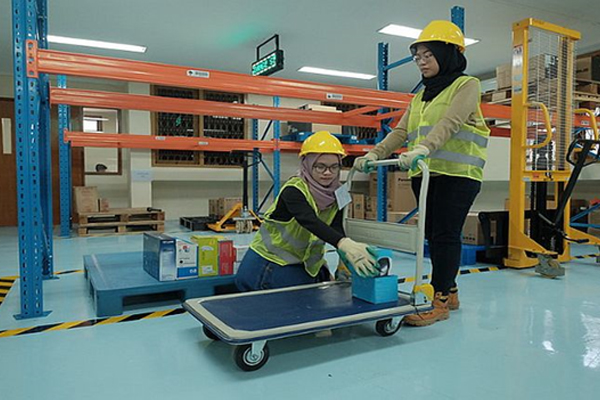Industry-school partnership gives better opportunity for youth to decent jobs
To learn more about perspectives of Indonesian youth on transitioning from school to work, the ILO in collaboration with GRID Network, a leading media network, conducted a survey last December, reaching out to 2.442 female and male youth aged 15-24 years old in 10 cities. The results of the survey was elaborated with interviews early this year, capturing the perspective of experts and some respondents.
The survey reveals that from those who are confident in getting decent jobs, 89 percent have participated in school to work transition programmes, such as, among others, the apprenticeship programme, visit to industries, teachers/lecturers from industries. However, 1,555 respondents (47.3%) stated that educational institutions have not yet provided them with adequate skills and knowledge to enter the world of work.
The survey was conducted as part of a joint UN project, “Integrated Solutions Platforms: Vocational Education Training (TVET) – Industry Collaboration”, aimed to promote industry- TVET collaboration to reduce skills mismatches and to promote cost-sharing of the delivery of TVET between the government and private sector.
It was also supported by the ILO's Industry Skills for Inclusive Growth (In-Sight) Project Phase-2 . Funded by the Government of Japan, the project aims promote mechanisms and practical approaches that enable industries and workplaces to become drivers of sustainable and inclusive growth in the Asian region.
Benefits of school-to-work transition programme
The most beneficial transition programme according to the survey is the apprenticeship programme. Around 92 percent of the surveyed youth revealed that apprenticeship programme has provided them with relevant skills and real working experience that would smooth their transition from school to work and provide them with a better opportunity to get decent jobs.
“I just finished my apprenticeship with a contractor company. The apprenticeship programme has given me a job experience that helps me find a real job,” said one of the respondents, Abiel Kristianto who is now a junior architect.
The benefits of apprenticeship programme have made the majority of respondents (97.9%) are eager to participate in the programme if they have given a chance. However, the survey also reveals that youth still need support and access from schools to participate in the apprenticeship programme.
Only 35 percent participants have shown self-initiative to participate in the apprenticeship programme. One of them is Rosyanti Lestari. When she faced difficulty in finding a job after graduating from marketing major of the vocational school, she initiatively joined the apprenticeship programme at Hotel Bumi Wiyata, a pilot apprenticeship programme conducted by the ILO and hotel industries.
“The apprenticeship programme is really beneficial as it provided me with required skills and a real job experience; thus it has helped me find a decent job at hotel industry,” told Rosyanti who has secured a job at one of the five-star hotels in Jakarta.
A similar initiative was also taken by Dio. During his apprenticeship, he learned skills related to the profession that he intended to pursue in journalism. “During the apprenticeship I learn skills that are never taught at school.”
In addition to the apprenticeship, other beneficial transition programmes identified include joint seminars with industries, visit to industries, teachers/lecturers from industries, introduction to professions and so forth. Satrio Utomo, a graduate of vocational school, was one of the students benefitting from these transition programmes.
“During my visit to the industry with my school, we were explained about skills and competencies needed for different areas of works. It really opened my eyes about skills needed and condition of the workplace that are different from what we learn in the classroom,” he told.
|



